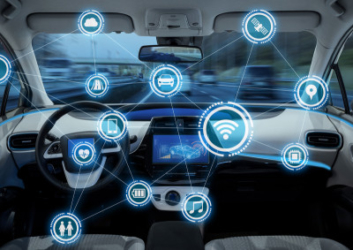This piece is an interesting read from Car and Driver we wanted to share with you.
Automotive cybersecurity is a challenge. A number of challenges, actually. Automakers are challenged to protect their cars. Hackers see a challenge in getting into your car. And if you were to challenge most drivers to identify how secure or vulnerable their vehicles are, you would probably get nothing but blank stares.
“Vehicles are nothing more than computer networks on wheels now,” automotive security expert Alissa Knight told Car and Driver. Knight is the author of the forthcoming book Hacking Connected Cars: Tactics, Techniques, and Procedures, and her information page for the panel she spoke at during CES calls her “a recognized hacker.” Customers don’t have a lot of options in how their vehicle is secured, she said. If someone is shopping for a car, it’s more than a little difficult to bring their own firewall to protect the vehicles from hacking attacks.
“You need to rely on the [auto manufacturers], but if you think about it, the automakers are . . . building a bastardized stack of other people’s products,” she said.
And suppliers are limited in the kind of security they can offer the automakers, Knight said. They can’t go in and harden a vehicle’s code, because it belongs to the automaker. One thing a supplier can do is build a device that sits in the network to monitor and block inappropriate traffic. Knight cited an ECU-based firewall from TowerSec that works like a firewall on a traditional computer network to limit traffic, defining which devices can talk to which other devices, as an example of a way for automakers to get better control of their connected cars. TowerSec, an automotive security firm based in Israel and Michigan, was acquired for $70 million in 2016 by Harman for its connected-car division.
Knight said she believes getting everyday drivers to understand the risks is going to be a long evolution. Many people still don’t understand security in personal computers, and those have been in general use for around 30 years.
“The consumer is 100 percent at the mercy of the automaker to secure that vehicle,” she said. “What the consumer needs to do is not ask what kind of leather it has or if you can get Facebook on the head unit. They have to ask questions like, Can the head unit communicate with the steering column and other life-safety units? And if so, why? Consumers need to ask these questions until the automakers get it.”
Pursuing Cybersecurity with Carmaker Partners
A modern or future connected car probably can’t be 100 percent secure, at least in the near future. The Israeli company GuardKnox was also at CES this year to talk automotive cybersecurity and share its ideas for anti-hacking protection by teaming with major automakers. A spokesperson told C/D that even though GuardKnox products are not currently deployed in vehicles, the company expects to make product announcements in 2020, most likely in Europe and Asia.
GuardKnox was formed in 2015 by a group of Israel Air Force cybersecurity R&D veterans. It opened an office in Ann Arbor, Michigan, earlier this month and, in the middle of 2019, raised $21 million in Series A funding, including money from two automotive industry investors, Shanghai Automotive’s SAIC Capital and Faurecia.
GuardKnox is publicly talking about two partnerships it has with automakers. First, it’s working with Porsche on an ECU-based secure network orchestrator that protects in-car communications from outside hacking attacks. Second, GuardKnox claims a partnership with Daimler’s pre-development and innovation department on wireless interactive accessories that use GuardKnox’s Bluetooth-to-CAN gateway—again, to prevent hacking.
Recent Posts
The U.S. Department of Labor Announces Proposed Rule To Protect Indoor, Outdoor Workers From Extreme Heat
The U.S. Department of Labor has proposed a new rule aimed at protecting workers from extreme heat hazards. This initiative seeks to safeguard approximately 36 [...]
Supreme Court Overturns Chevron Deference: What It Means for Workplace Safety and Regulation
The landscape of federal regulation is set for a seismic shift following a recent Supreme Court decision. On June 28, in Loper Bright Enterprises, et [...]
Navigating the Compliance Maze: How NARFA Simplifies Employee Benefits for Automotive and Trade Industries
In today's complex regulatory environment, businesses in the automotive, roads, fuel, and related industries face unprecedented challenges in managing employee benefits. Recent studies show that [...]




